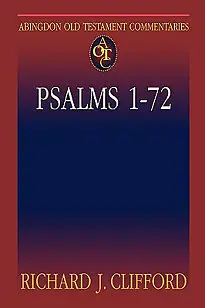

Psalms 1-72
in Abingdon Old Testament Commentaries
Pages
288 pages
Publisher
Abingdon Press
Published
2002
ISBN-13
9780687027118
Clifford differs from other commentators on the Psalms chiefly in his concern with the inner dramatic logic of the Psalms - how they organize the experience and desires of the "pray-er" and bring them to a proper conclusion. His primary concern is to help readers see the pattern and progression within the Psalms, while at the same time attending to the richness of their words and the texture of their imagery.
Reviews
Richard Clifford, who is Professor of Bible at Weston Jesuit School of Theology and a well-respected authority on the Psalms, has produced a rewarding commentary on the first two books of the Psalter. Clifford views the Psalter as a collection of Israel�s prayers (corporate and individual). As such, he focuses on helping contemporary �pray-ers� to understand the intricacies of Hebrew prosody as well as the themes and thought patterns implicit in its imagery so that its message may be appropriated for the Christian church. The introduction treats the standard issues that arise in Psalter studies: the shape of the Psalter, its relationship to the worship in the Second Temple, the genre of individual psalms, and the rudimentary features of Hebrew poetry. Moreover, under the rubric �Observations on the Theology in the Psalms ,� Clifford provides a discussion of two implied narratives that reside beneath four recurring themes in the Psalter: divine kingship, the temple, the Davidic king, and YHWH�s deeds. He roots the first three in the implied narrative of the biblical adaptation of the old Mesopotamian and Canaanite �combat myth.� In the Old Testament, this acco unt culminates in God�s creation of Israel or the world. The implied narrative for YHWH�s deeds is exemplified in Ps 114, in which a mixture of cosmic and historical language is employed to describe the foundational actions of God in the creation of Israel as the people of God.
[Full Review]
Robert L. Flowers Professor of Old Testament, Duke University Durham, NC 27708 The intended readers of this commentary, theological students and pastors, are well served. Clifford writes simply and clearly, concentrating on theological and literary features of individual psalms. The commentary format requires considerable overlap, given the preponderance of laments in the first seventy-two psalms, but repetition is kept to a minimum, except for the guiding rubrics: (1) literary analysis; (2) exegetical analysis; and (3) theological and ethical analysis. Perhaps in future volumes such discussion can be integrated and the themes controlled by the nature of each psalm. The author of this commentary provides the obligatory introduction, albeit quite brief. In it he discusses the Psalter as a book and as a window into Israelite worship at the temple; treats the major literary types of psalms (hymn, lament, thanksgiving, and other); emphasizes the monotheistic context of biblical worship; mentions two implied narratives (the combat myth and Yahwehʹs mighty deed); addresses the problem of the deleterious effect on modern praying of violent expressions against enemies in some psalms; and asserts that the psalmists had no interest in history as it really happened but did have a fondness for carefully crafted logic.
[Full Review]
